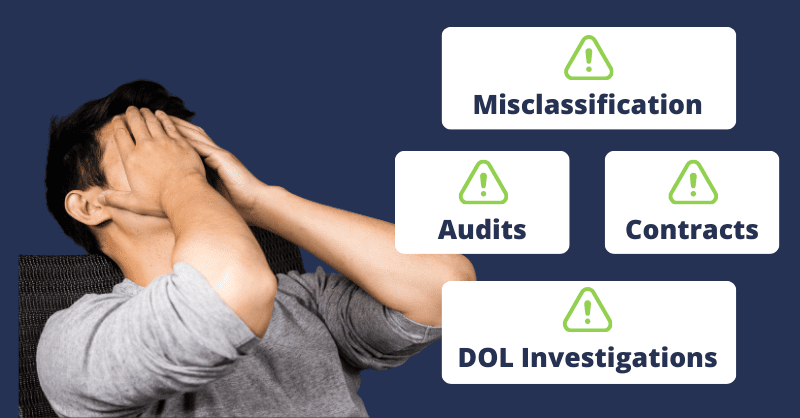Workforce Compliance: It Only Takes One

Is your company prepared?
Navigating the intricate landscape of employment law and freelancer management requires precision, as the margin for error is surprisingly narrow. A single misstep, whether it’s in classifying workers, managing contracts, or handling disputes, can set off a chain reaction of negative consequences. It only takes one of the following mistakes to trigger extensive legal, financial, and reputational damage, underscoring the importance of meticulous and informed management practices in today’s business environment.
1) Government Investigations & Independent Contractor Misclassifications
Government agencies, such as the Internal Revenue Service (IRS) or Department of Labor (DOL) in the United States, may conduct audits and specifically review to ensure proper classification of workers. If they find that freelancers are misclassified as independent contractors when they should be employees, the company could face significant penalties, legal fees, and back payment of wages, benefits, taxes, all while also navigating internal disruptions to rectify the error.
2) Disgruntled Freelancers, Whistleblowers, & Class-Action Lawsuits
Any dissatisfied freelancer, groups of freelancers, employees, or whistleblowers within an organization can disclose potential misconduct to government agencies, initiating investigations, legal actions, and possibly resulting in fines and public relations crises. In countries like the US, the DOL has established various whistleblower protection programs that provide incentives to come forward with information about violations, reinforcing the importance of compliance.
3) Poorly Written Freelancer Contracts & Records
Poorly written freelance contracts and inadequate record-keeping expose companies to local and federal misclassification risks. Ambiguous contracts increase the likelihood of disputes over key employment factors, while the absence of detailed records makes it challenging to demonstrate the independent nature of the contractor relationship. In legal reviews, the lack of quality records may contribute to misperceptions that freelancers should be classified as employees.
4) Erroneous Unemployment Claims and Increased Regulatory Audits
Freelancers incorrectly classified may result in erroneous unemployment claims, triggering complex audits and assessments by regulatory agencies. Mishandling such claims can lead to financial losses, legal repercussions, and a damaged corporate image, emphasizing the critical need for precise and compliant unemployment practices.
November 2023 – Uber and Lyft agree to $328 million NY State Settlement for misclassification
August 2023 – San Francisco sues Qwick alleging independent contractor misclassification
August 2023 – R&R construction pays more than $1.6 million in independent contractor misclassification
July 2023 – Minnesota forms a new advisory task force on worker misclassification
July 2022 – A multi-national investigation of Nike estimates the potential for over $530 million misclassification risk
Mitigate Your Risk with the Help of Plannernet
Mitigating compliance risk without disrupting business operations can be daunting. Thankfully, it doesn’t have to be. As a part of our end-to-end talent solution, Plannernet supports organizations in assessing their event workforce compliance needs and areas of risk, ensuring clients maximize the value of freelance talent without inviting costly penalties.
Compliance is a moving target, but with our proactive monitoring, regular consultation and fully compliant business model, organizations can remove the weight of compliance off their shoulders and enjoy a frictionless freelancer engagement experience.
Why wait? Don’t get caught in the web of workforce compliance. Contact us to get started.
This article is information only and certain information may have changes, in addition this article does not constitute legal, financial, or professional advice. If you require any such advice, please consult with a qualified professional in the relevant field.

